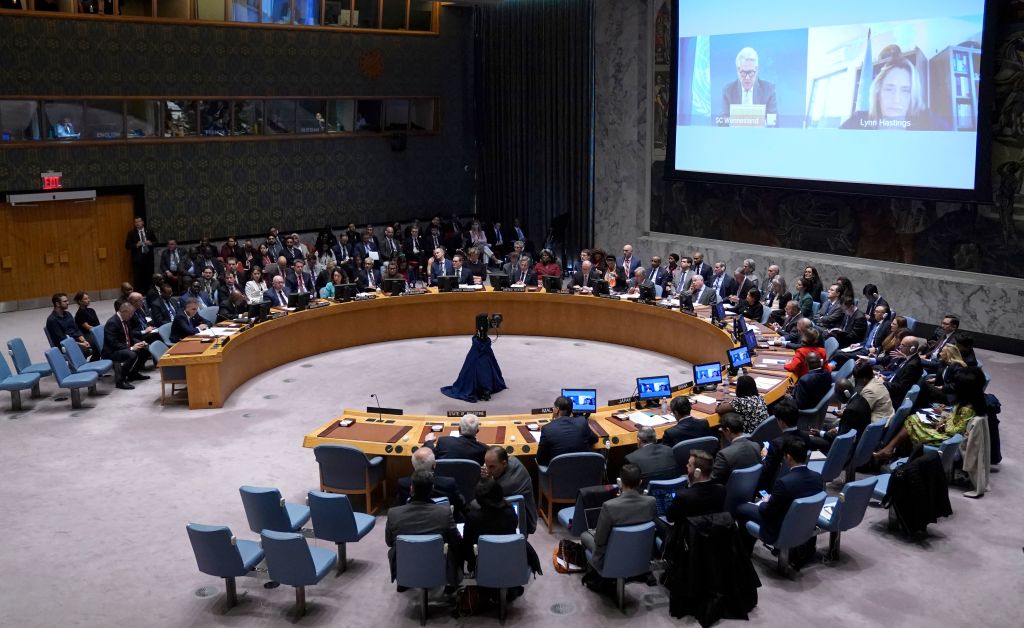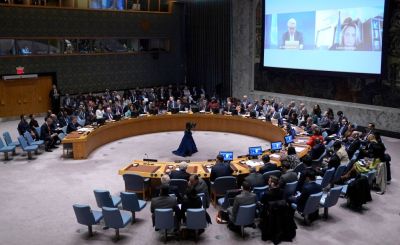As Israel’s ground war in Gaza looms, what might lay at the other end of the fog of war? What political conditions can establish lasting peace after the shooting stops?
That is the question the United States failed to answer after Iraq and Afghanistan. The U.S. tried military occupation followed by democratization in Iraq. It avoided an occupation in Afghanistan, instead handing over power immediately to an interim government.
But what the U.S. didn’t try in either case was state building—with dire results. A failed Iraqi state may have held elections, but they empowered incompetent sectarians and the country later devolved into civil war. A new elected government may have formed in Kabul, but a power vacuum nevertheless developed in the Afghan countryside which the Taliban easily filled.
If Israeli officials have envisioned an end to their war against Hamas, other than the terrorist group’s destruction, they haven’t shared it. The relevant question now is: Who will govern Gaza, and how?
Since 1918, the territory has been governed by the United Kingdom, Egypt, Israel, the Palestinian Authority, and Hamas. None has been successful.
The Palestinians have a rightful claim to Gaza under the terms of the 1995 Oslo Accords and the 1947 U.N. partition plan. Ideally, therefore, Gaza would transition back to the Palestinian Authority. But the Palestinian Authority today is incompetent, corrupt, and authoritarian (though not nearly as bad as Hamas). It is unlikely that the Palestinian Authority could govern Gaza, keep out Hamas (which won a war between the two in 2007), or maintain public order for Palestinians—much less meet Israel’s security needs.
Gaza is one of the poorest and most misgoverned places on the planet. In the past, when confronted with drastic conditions of state failure, the United Nations stepped in to establish an international transitional authority. It did so in Cambodia in 1991; East Timor in 1999; and Kosovo the same year.
None of the U.N.’s previous interim administrations were without their problems, yet they were roughly successful. While Cambodia, Kosovo, and East Timor will continue to grapple with the aftereffects of war and privation for generations to come, today they have assumed control over their own governance.
In the short run, a U.N.-mandated international administration of Gaza is the least-bad solution.
Unlike another occupation authority—the U.S., for example, or Israel—the U.N. would be seen as relatively impartial. No one suspects the U.N. would use an interim administration as an excuse for empire. If anything, the U.N. would be overly eager to hand power to the Palestinian Authority before it was ready.
A U.N.-run interim administration in Gaza would not be empowered to negotiate final status arrangements with Israel. It would focus on immediate needs: turning the lights back on, cleaning out the rubble, getting water treatment plants online, and patrolling streets. After meeting immediate humanitarian needs, the interim administration would help reconstitute the local police, reopen schools and courts, and form local governing bodies.
Reforming the Palestinian Authority is a necessary—but much bigger—project. The Palestinian Authority has not held elections since 2006, and it has a notorious history of corruption. Bringing the PA’s budgeting and accounting up to international standards of transparency and accountability is a prerequisite to channeling aid money through the PA so that it can rebuild and eventually govern Gaza.
If the goal is nation building, then the international community must frankly embrace it. The United States failed in Iraq and Afghanistan because it shied away from that effort. But state failure is why Syria, Libya, Somalia, Venezuela, and too many other states remain prone to political violence and instability. And hostile nonstate actors—like organized crime and black market traffickers in weapons, drugs, and people—thrive in poorly governed territory.
Critics routinely argue that nation building is unrealistic. It is difficult, of course, but the international community learned important lessons during prior missions in the 1990s, including in Bosnia, Sierra Leone, and Central America. The cost and risk of nation building must be measured against the cost and risk of the alternative. From the longer perspective of history, standing by and allowing the problems to fester for yet another generation is the least “realistic” option.
Israel cannot and should not try to be the chief Palestinian nation builder. Israel has a different priority and a different role to play. Before an international nation building effort for Palestine can begin, Hamas must be destroyed. Israel’s military capabilities can do that.
But if the war ends with nothing more than bombs and bullets, little will have been accomplished. Gaza will remain mired in misery, and the Palestinians will be no closer to achieving the just goal of sovereignty long envisioned by the 1947 partition plan and the 1995 Oslo Accords. Israel will be a little safer in the short run, but another group of copycat jihadists is likely to take Hamas’ place if the Palestinians do not see a brighter future under other leadership.
The goal is a just and lasting peace between Israel and Palestine. For that to happen, there must be a Palestinian state under the authority of a capable, legitimate, and accountable government. There isn’t one today. The international community must step in to be that government in the short run while building a Palestinian government in the long run.
Click here for more coverage of the war in Israel.







Please note that we at The Dispatch hold ourselves, our work, and our commenters to a higher standard than other places on the internet. We welcome comments that foster genuine debate or discussion—including comments critical of us or our work—but responses that include ad hominem attacks on fellow Dispatch members or are intended to stoke fear and anger may be moderated.
With your membership, you only have the ability to comment on The Morning Dispatch articles. Consider upgrading to join the conversation everywhere.